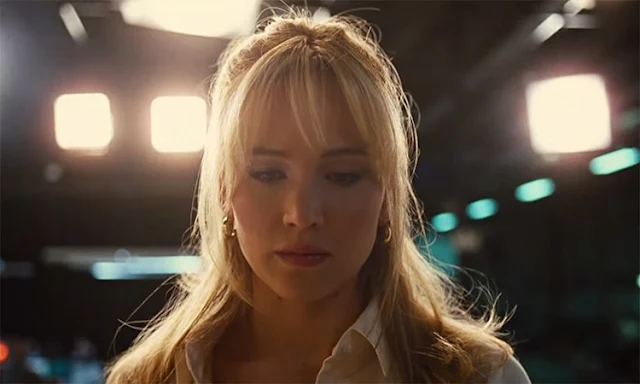Ms. Deeds
David O. Russell's Joy (2015)--about Joy Mangano, creator of the Miracle Mop and early diva of the QVC cable network--is an interesting biopic in that it isn't. According to an article in Vanity Fair the multimillionairess kept most details of her life a guarded secret--what little the public knows is carefully doled out to form a manicured image of the woman. When the idea was suggested to Ms. Mangano that she tell her story, a script (by Annie Mumolo) was commissioned that focused less on her early life and more on the development of the mop, Joy's first real success. When Russell came on board he submitted an alternate proposal: a fictionalization of her life, with fact and fantasy artfully blended.
You see the end result: Russell cut Joy's children from three down to two, fiddled with their names, altered some characters (Joy's husband Tony Miranne (Edgar Ramirez) was not an aspiring Venezuelan singer but a fellow business student from Pace University) created others (Joy's half-sister Peggy (Elisabeth Rohm), is entirely fictional) combined still others (QVC executive Neil Walker (Bradley Cooper) is an amalgam of founder Joseph Segel and several other executives).
On the other hand it is true Joy invented a florescent flea collar; that she talked the QVC folks into appearing on the channel herself when her mop wasn't selling well; that on her first appearance she sold 18,000 mops in an hour.
Russell did something similar before: in Silver Linings Playbook he was adapting Matthew Quick's novel of the same name but also drawing on his experience as father to a bipolar son. In The Fighter (Mickey Ward's mother and sister), Spanking the Monkey (Susan), and American Hustle (not a family linked by blood but by profession and marital relation) Russell depicts fictional or real-life figures, but with such vividness--caught in such a tangle of feelings--that you sense personal investment on his part, a touch of autobiography (in tenor and feel, if not fact) thrown in. With Joy and her basement-based ex-husband, her bed-ridden mother (not Joy's actual mother but again a composite of several characters), her hostile half-sister and temperamentally troublesome father, you still can't quite catch Russell drawing from personal experience red-handed...but are left suspicious nevertheless.
So what's Russell trying to do? A fable is my guess--an inspirational tale about a woman imposing control over her chaotic life, not too far in tone and spirit from the infomercials that turned her into such a success (watch this movie and turn your own life around!). The film takes the form of crusader women stories such as Steven Soderbergh's Erin Brockovich only instead of wielding self-taught legal smarts the heroine wields that most common of household devices, the floor mop. I suspect Japanese filmmaker Yasujiro Ozu if he were alive would appreciate the homeliness of Russell's premise--would even appreciate the fact that the film is paced and edited and told like a deadpan comedy.
All in Russell's appealingly fluid visual style, smooth handheld shots cut together with precision and accompanied by a wide ranging selection of pop music, from Frank Sinatra to The Rolling Stones to Rodgers and Hammerstein to Cream. Yes he's channeling early Scorsese (Charlie's dreamlike (nightmarish?) glide into a bar in Mean Streets, among others) but with digital cameras doing it smoother and longer and with more exuberant joy--yes I went there--than Scorsese himself has managed in recent years (or, conversely, Scorsese has so mastered that early look he's since moved on and refused to look back). Yes Russell's taking his cue from someone else but it's such an indispensably gorgeous lifeloving style I submit someone's got to do it somewhere sometime; might as well be Russell.
So far I've invoked Soderbergh, Scorsese, Ozu; I've tried to link the film to Russell's earlier work. Might as well go whole hog and suggest yet another name: Frank Capra. People look at Capra's films as fables of the American Dream and at times Nightmare, often both in the same feature. Joy in Joy you might say is the reincarnation of George Bailey, Longfellow Deeds, Jefferson Smith--the simple hero of lower to middle class with the crazy idea (go see the world; give all your money away; honesty) that people just won't stand for (Deeds and Smith succeed; Bailey doesn't, which is why I don't quite grasp people who describe the ending of It's a Wonderful Life as happy (he's not happy, just successfully brainwashed)). Joy seems to plug directly into Mr. Deeds late in the film when she's bent and beleaguered at all sides; like Deeds she's not actually beaten--in the very next scene (skip the rest of this article if you plan to see the film!) she demonstrates how important reading the fine print (something she (all of us, boys and girls!) should have done in the first place) and properly doing one's homework--the research and verification--can be for a successful contract renegotiation.
The ending with Joy firmly installed in her success doling out financial emotional and spiritual support like a Grand Duchess (or fairy godmother) is as tolerable or intolerable as the most memorable Capra; if you liked the ending of It's a Wonderful Life--which not everyone does, even in its misunderstood state--then you should be able to swallow this movie's whopper of a finale just fine. I'm reminded of what Pauline Kael once wrote of the filmmaker: "No one else can balance the ups and downs of wistful sentiment and corny humor the way Capra can--but if anyone else should learn to, kill him." Russell is a fast learner, apparently; someone ought to keep a close eye on him.
First published in Businessworld 2.19.16


2 comments:
The paragraph where you invoked Welles is missing.
I must have overedited. O well, plenty of filmmakers to go around...
Thanks for the heads up.
Post a Comment